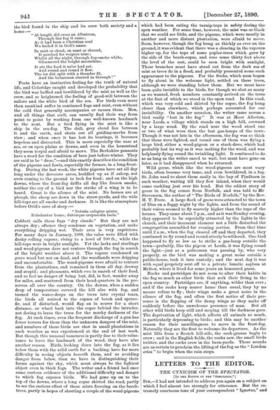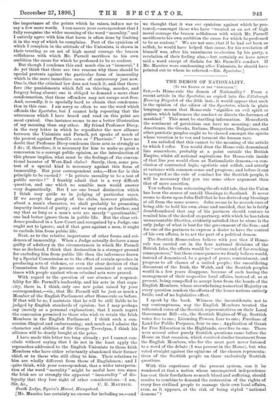LETTERS TO THE EDITOR.
THE CYNICISM OF THE SPECTATOR.
[To THE EDITOR OF THE "SPEOTATOR.".1 SIB,—I had not intended to address you again on a subject on which I feel almost too strongly for utterance. But the ex- tremely courteous tone of your correspondent " Ignotus," and
the importance of the points which he raises, induce me to -say a few more words. I can assure your correspondent that I fully recognise the wider meaning of the word " morality," and I entirely agree with him that harm is often done by limiting it in the way of which he complains. Part of the cynicism of -which I complain in the attitude of the Unionists, is shown in their treating as an act of high moral courage the brazen -selfishness with which Mr. Parnell sacrifices to his own _ambition the cause for which he professed to be so zealous.
But though I condemn this and much else as " immoral," I -do yet think that there are two reasons why there should be special protests against the particular form of immorality -which is the more immediate cause of controversy just now. One is, that the criminal law does not touch it, and that there- fore (the punishments which fall on thieving, murder, and forgery being absent) one is obliged to demand a more clear
• condemnation, that these offenders may not escape scot-free. And, secondly, it is specially hard to obtain that condemna- tion in this case. I am sorry so often to use the word which -offends the Spectator, but I cannot help repeating that the utterances which I have heard and read on this point are most cynical. One instance seems to me a better illustration of my meaning than any other. My friend Professor Dicey, in the very letter in which he repudiates the new affiance between the Unionists and Parnell, yet speaks of much of the protest against Parnell's acts as " Pharisaic." I have no -doubt that Professor Dicey condemns these acts as strongly as I do ; if, therefore, it is necessary for him to make so great a -concession to a corrupt public opinion, as the introduction of 'this phrase implies, what must be the feelings of the conven- tional haunter of West-End clubs ? Surely, then, some pro- -test of a special kind is necessary against this form of immorality. But your correspondent asks,—How far is this principle to be carried ? " Is private morality to be a test of public service P" I frankly admit that is a very difficult -question, and one which no sensible man would answer -very dogmatically. But I see one broad distinction which I think may guide us in judging of particular cases. If we accept the gossip of the clubs, however plausible, about a man's character, we shall probably be promoting impurity instead of purity ; and we may even go further, and say that as long as a man's acts arc merely " questionable," -one had better ignore them in public life. But the clear evi- dence produced in a Law-Court and recognised by a Judge, one
• ought not to ignore ; and if that goes against a man, it ought to exclude him from public life.
Next, as to the relative importance of other forms and evi- -deuces of immorality. When a Judge actually declares a man :guilty of adultery in the circumstances in which Mr. Parnell was so declared, I think that declaration is a stronger ground for excluding him from public life than the inferences drawn by a Special Commission as to the effect of certain speeches in producing acts of violence, or even the clear decision of that 'Commission that the persons accused associated at certain times with people against whom criminal acts were proved.
With regard to the question of our absence of responsi- ,bility for Mr. Parnell's leadership, and his acts in that capa- city, there is, I think, only one new point raised by your -correspondent,—viz., that Mr. Parnell will be just as much a Member of the English Parliament after Home-rule as before. If that will be so, I maintain that he will be still liable to be judged by English standards of opinion ; but I may perhaps :say (merely as a personal explanation), that I much regret -the concession promised to those who wish to retain the Irish Members in the English Parliament. I think such a con- -cession illogical and embarrassing; and, much as I admire the -character and abilities of Sir George Trevelyan, I think his -alliance will be dearly bought at the price.
I have made this letter too long already ; yet I cannot con- -elude without saying that I do not in the least apply the reproaches addressed to the English Unionists to those Irish Members who have either reluctantly abandoned their former -chief, or to those who still cling to him. Their relations to him are wholly different from those of Englishmen ; and I • garite think, with your correspondent, that a wider interpreta- tion of the word " morality " might be useful here too, since the Irish see so strongly the apparent " immorality " of dis- loyalty that they lose sight of other considerations.—I am,
Sir, 8z.c., C. E. MAURICE. South Lodge, Squire's Mount, Hampstead.
Dir. Maurice has certainly no excuse for including us,—and
we thought that it was our cynicism against which he pro- tested,—amongst those who have treated as an act of high moral courage the brazen selfishness with which Mr. Parnell sacrifices to his own ambition the cause for which he professed to be so zealous." We are not sure that if he had not been so selfish, he would have helped that cause, for his revelation of himself was, after his unanimous re-election by his party, a revelation of their feeling also,—but certainly we have never said a word except of disdain for Mr. Parnell's conduct. If Mr. Maurice were condemning other Unionists, he should have pointed out to whom he referred.—En. Spectator.]



































 Previous page
Previous page